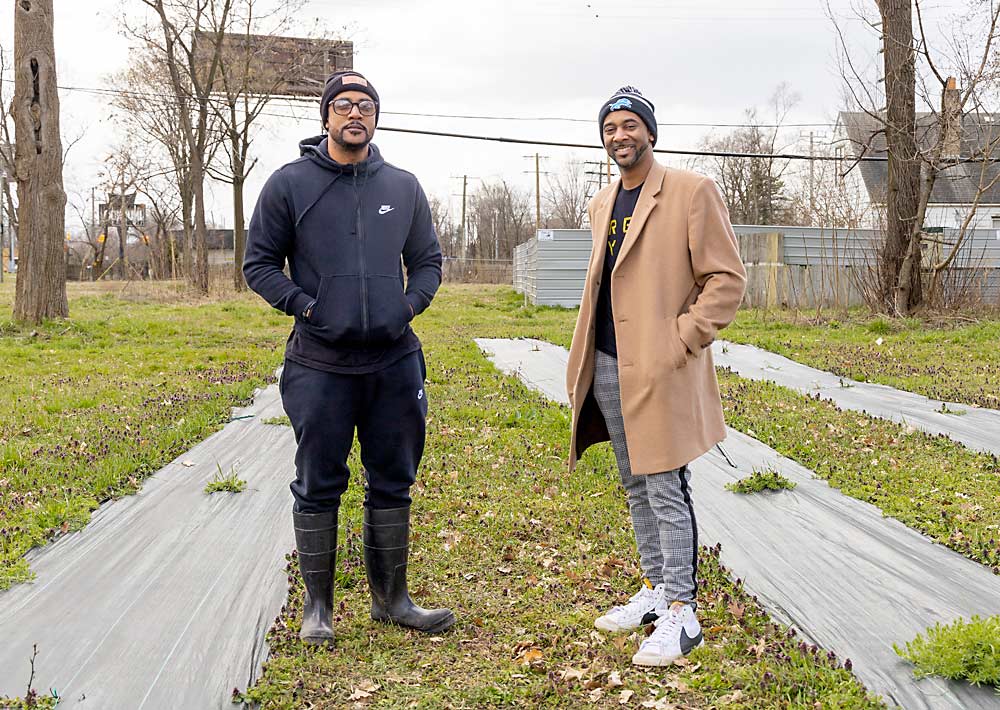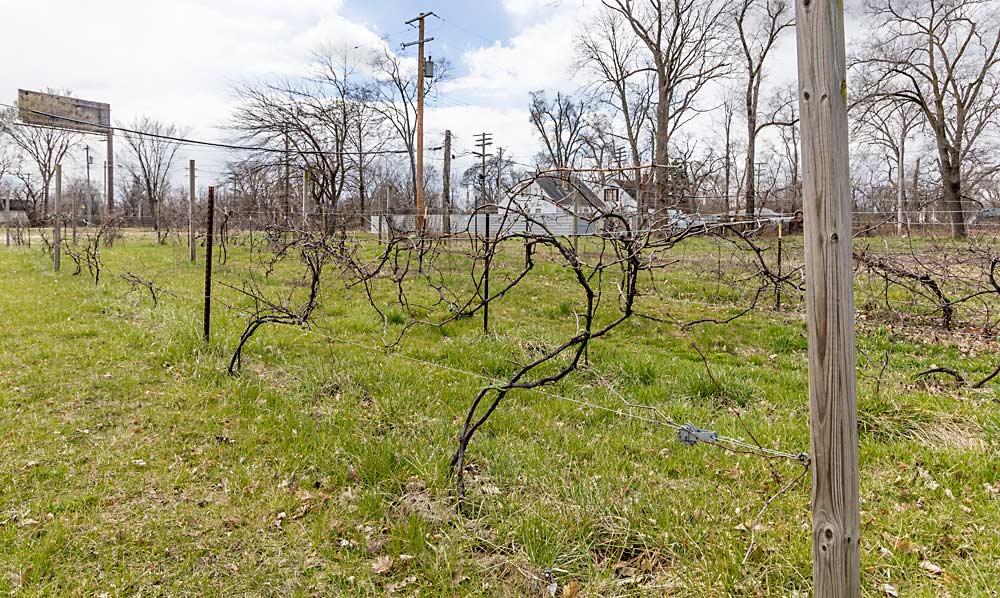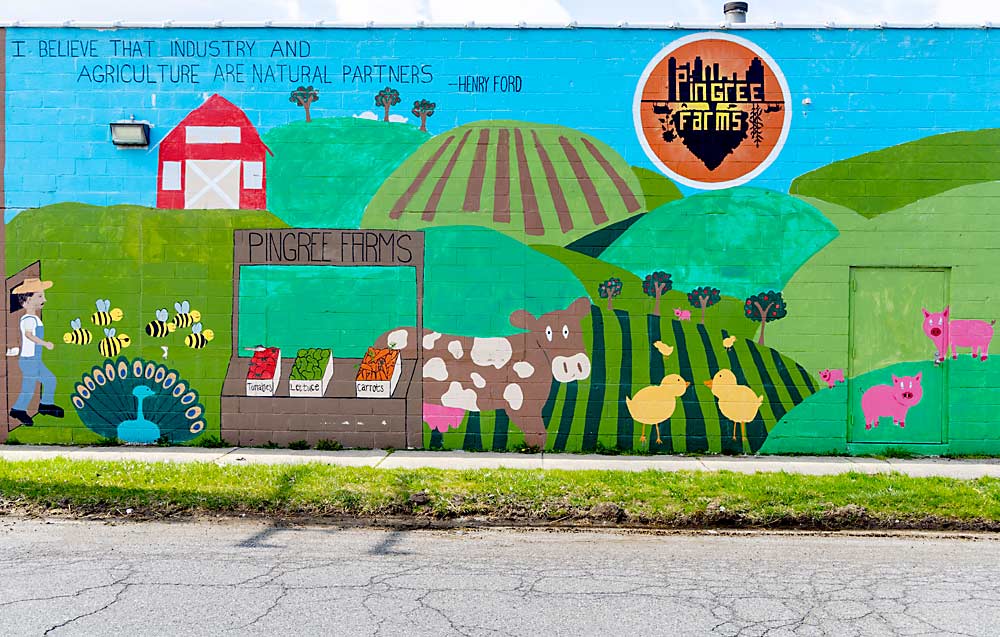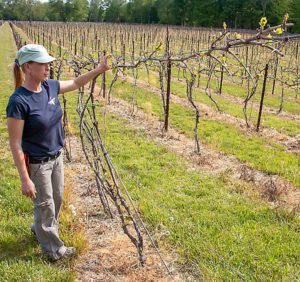—story and photos by Matt Milkovich

Vineyards are scarce in Southeast Michigan, and even scarcer in the city of Detroit. A small group of winemakers and entrepreneurs aims to change that.
In early April, Peter King stood next to the first sign of that effort: three rows of Pinot Noir vines growing in an empty lot in northeast Detroit. The lot, owned by an urban farm, is adjacent to a freeway, railroad tracks and a manufacturing complex.
King and his partners want to grow these “humble beginnings,” as he described them, into a national winery and vineyard focused on making rosé and sparkling wines. The co-founder of Drew Ryan Wines was expecting a bonded winery license to arrive any day, and he and his partners were in the midst of turning a nearby warehouse into a winemaking facility. They’d already come a long way and still have a long way to go.
“They are approaching their craft and model pragmatically by focusing on rosé and sparkling wine production, which will require high acids — something we can generally count on in Michigan,” said Brian Lillie, vice president of hospitality operations and distribution at the Chateau Chantal winery in Northwest Michigan and president of the Michigan Wine Collaborative. “These also happen to be two trending categories in the wine space. I’m confident they will find success.”
The inspiration began with King’s family: He grew up watching his dad make wine and later started making his own as a hobby. Those skills impressed his friend, and now business partner, Matthew Jones.
“I was like, ‘Whoa, that’s amazing,’” Jones said. “Being honest, us as Black people don’t come across things like that very often. I’m forever grateful Peter set it up.”
King, Jones and Merrick Steele, a mutual friend, decided to start their own vineyard and winery. Jones’ father, Brian Jones, cleared a winemaking space for them in his basement. All four men are now partners in Drew Ryan Wines (“Drew Ryan” is a combination of some of the partners’ middle names).
As they learned more about grapes and winemaking, and they started dialing in wine styles, reactions to their product got better and better — not just from friends and family but from wine professionals.
“We went from just playing around to, like, ‘We need to sell this,’” Jones said.
They bought more winemaking equipment and started reaching out to people in the Michigan industry. A few years ago, King joined the Michigan Wine Collaborative, a trade group that promotes the state’s wine industry. He’s now the treasurer.
Pingree Farms, a nonprofit urban farm owned by Milton Manufacturing in Detroit, gave the Drew Ryan team access to land to grow their own grapes and a warehouse to make wine. They planted their first vines last June. They started with Pinot Noir, a variety that works well in sparkling wines, King said.

Pingree Farms already had a few rows of grapevines planted by Michigan 4-H on the lot, which encompasses an acre or two on the northeast side of Detroit. The Drew Ryan team agreed to manage those vines as well as their own. Growing grapes in an urban environment has its challenges. They’re figuring out ways to keep the deer and coyotes out. And not long after they planted their first vines, someone pulled them out of the ground and stole some of them. Fortunately, Chateau Chantal donated new Pinot Noir vines, which they planted the following month. The vines will take about three years to start producing, King said.
Meanwhile, he’s learning about vineyard management. He’ll put up a trellis this year, and he plans to eventually fill the entire lot with grapevines. He’s still figuring out the most effective ways to fertilize the sand-and-loam soil. He’d prefer to use earthworm castings and other organic materials, but those are expensive.
One of his goals is to boost grape growing in Southeast Michigan and take advantage of the region’s longer growing season. What he and his partners don’t grow, they’ll buy from other Michigan vineyards, King said.

Lillie said each Michigan region has its grape-growing challenges. In Northwest Michigan, they worry about shorter growing seasons. In Southwest Michigan, especially in the past several years, they worry about spring frosts and freezes. In Detroit, the problem might be increased moisture pressure that encourages the growth of molds and fungi.
But the potential of the Detroit River’s unique microclimate intrigues King.
“I think we can produce top-quality rosés and sparkling wines,” King said. “Michigan is a hidden gem for sparkling wine, and Michigan rosés can compete with anybody.”
Drew Ryan Wines remains a part-time endeavor, but the partners hope it will become a major brand one day. King and Jones said their immediate customer base will probably be Detroit-area millennials who like wine or want to learn more about it.
“If you enjoy good food and a good time,” King said. “That’s our audience.” •







Leave A Comment